For whatever reason, I read a LOT less in 2022. I’m trying to get better at processing the books that I read (reading through all my highlights a few times to try to absorb the wisdom), which takes more time. And I journaled more which is slow but beneficial. But mostly I just read less! Reading is truly a habit that snowballs (and vice versa).
There’s always next year!
The Top Books I read in 2022:
- A Non-Anxious Presence by Mark Sayers
- I See Satan Fall Like Lightning by René Girard
- Escape from Freedom by Erich Fromm
- The Uncontrollability of the World by Hartmut Rosa
- Bowen family systems theory in Christian ministry by Jenny Brown
- Black Wave: Saudi Arabia, Iran, and the Forty-Year Rivalry That Unraveled the Middle East by Kim Ghattas
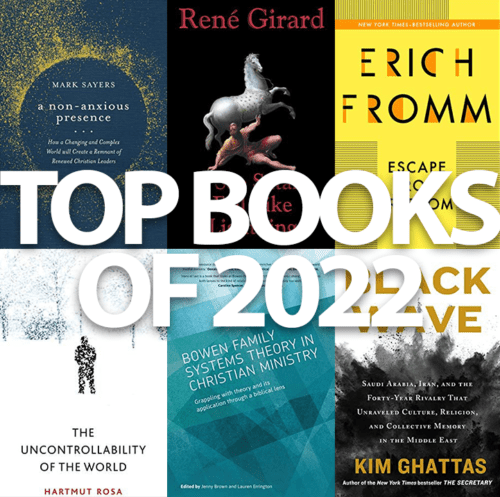
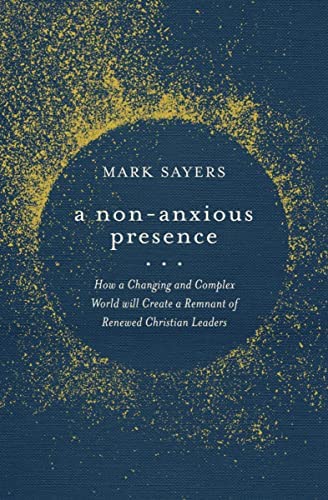
A Non-Anxious Presence by Mark Sayers
The days are dark and chaotic and things feel overwhelmingly complex. But it’s times like these when God moves in great ways. He will bring renewal through leaders who experience the presence of God and strike out boldly into the chaos as a non-anxious presence.
Sayers has become my favorite author for two reasons:
- He helps me understand the times.
- He gives me hope
Sayers is unique among writers in that he nails both the diagnosis AND the cure. Incredibly rare. Many books excel at diagnosis. Very few books offer a practical cure. One in a thousand excels at both diagnosis and cure. [I’m guessing it’s because writers who are smart enough to understand the times are so cloistered in academia and so buried in books that they aren’t connected to real people; they aren’t practitioners, only researchers/writers. Sayers somehow does both. He pastors a church and knows his flock yet still makes time to read, think, and write.]
Even more remarkable: Sayers communicates in simple, clear writing. This wisdom is not buried under dense academic writing.
Sayers is a voracious reader and one of his great gifts to the church is distilling vast amounts of learning into concise, easy-to-digest summaries. Sayers lives in Australia, and is thus more aware of global politics and economics, and better able to critique America.

I See Satan Fall Like Lightning by René Girard
I was led down the Girard rabbit hole from reading my favorite book last year: “Wanting: The Power of Mimetic Desire in Everyday Life” by Luke Burgis.
Girard was a French philosopher and anthropologist, not a theologian. But Girard found in the Bible (and specifically in Christ) the key to unlock the chains of oppression and strife. Neither “Wanting” or “I See Satan” are Christian books; the authors were secular truth-seekers (I believe both men were atheists until they discovered mimetic desire which led them both to follow Christ).
Girard identified the 10th Commandment as the key problem of all humanity: we want what our neighbor has. Girard called it mimetic (imitative) desire; our desires are shaped and influenced by the desires of others.
What is the antidote to mimetic desire? Girard says it is the imitation of Christ. More than that: “Jesus invites us to imitate is his own desire, the spirit that directs him toward the goal on which his intention is fixed: to resemble God the Father as much as possible.” We are to desire what Jesus desires – which is to resemble the Father as much as possible.
How does that kill mimetic desire? It breaks the chains of invisible conformity (wanting what our neighbor wants) and replaces it with the freedom of conformity to Christ.
“The commandment to imitate Jesus does not appear suddenly in a world exempt from imitation; rather it is addressed to everyone that mimetic rivalry has affected. Non-Christians imagine that to be converted they must renounce an autonomy that all people possess naturally, a freedom and independence that Jesus would like to take away from them.”
The second seismic discovery Girard presents:
perhaps our modern world’s only absolute value, a concern for victims, is a uniquely Christian contribution to the world. Christianity is the source of our “concern for the poor, the weak, the disinherited, the lowly… Our [modern] concern for victims is the secular mask of Christian love.” Much like Tom Holland’s book “Dominion”, Girard argues that human rights “and humanitarianism develop first on Christian soil.”
Ironically, “The concern for victims has became a paradoxical competition of mimetic rivalries, of opponents continually trying to outbid one another.” Girard argues that Satan has co-opted this Biblical idea and turned victimism into an ideology that uses victim status as a way to gain power.
“Our society is the most preoccupied with victims of any that ever was. The modern concern for victims obligates us to blame ourselves perpetually.”
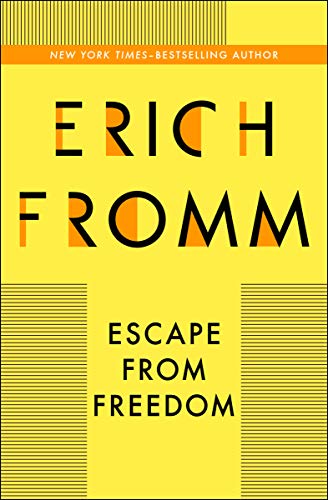
Escape from Freedom by Erich Fromm
Published in 1941 by a German seeking to understand the roots of Fascism. REALLY helpful for understanding the anxiety and powerlessness caused by isolation.
Moderns cannot bear the “freedom from”; the burden of isolation and powerlessness of being an individual in an overwhelming world, flooded by disjointed information (very strong Neil Postman “and now this…” vibes), stripped of structure and relationships.
Fromm lists three ways we deal with our aloneness:
- Authoritarianism
- Destructiveness
- Automaton Conformity
We see #1 in Nazi Germany and the modern day rise of populist Nationalism. #2 in mass shootings and rising suicide rates. And #3 in the absolute conformity demanded by our society on really any current topic (LGBTQ, Ukraine, masks, BLM). Those topics are not bad. But it explains our incredibly strong desire to say “I support the current thing”.
Fromm covers the Middle Ages, the reformation, the renaissance- charting the growth of new ideas like efficiency, individualism, capitalism, anxiety. Good (and much easier!) parallel to a Charles Taylor’s A Secular Age.
I initially gave the book 5 stars but went back and knocked a star off for it’s incredibly poor chapter on the Reformation and really wrong remedies proposed in the last chapter. I don’t know if I’ve ever read a book that’s such a mix of brilliant insight and bad thinking. But it’s mostly brilliant – 95% meat, 5% bones.
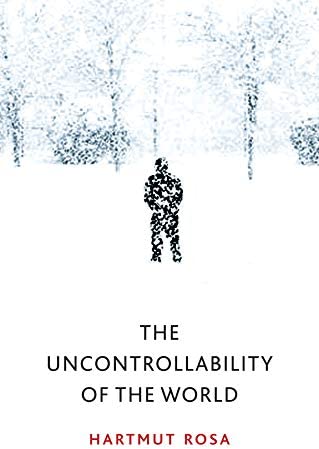
The Uncontrollability of the World by Hartmut Rosa
My favorite kind of book- a short, dense philosophical book that gives you new lenses to see the world better. Hartmut Rosa, a German university professor and sociologist, explains the consequences of a modern society driven by an “incessant desire to make the world engineerable, predictable, manageable… to make the world controllable at every level.”
Two problems with that:
1. A controlled world becomes grayed out, muted, it ceases to delight. (e.g. the dreary, lifeless humans of Wall-E on board the intergalactic luxury cruise ship, The Axiom). We are all Marie Antoinette now – “nothing tastes.” That feeling of being fully alive eludes us; which “leads to anxiety, frustration, anger, and even despair.”
2. “Human life [is] defined by uncontrollability.” We can’t control ourselves much less the world. Our own selves are frustratingly uncontrollable: our birth, our death (“Both the beginning and the end of life are uncontrollable”), our desires, our sleep, our subconscious thoughts. And paradoxically, despite amazing progress in subduing the earth through technology, medicine, and science – our modern world has become “increasingly uncontrollable, unpredictable, and uncertain.” See years: 2016-2022. Rosa calls it “The Monstrous Return of the Uncontrollable”. Our efforts to make the world controllable have produced a “radical form of uncontrollability.” And what’s worse, we lack the agency to do something about it. It’s all too overwhelmingly complex. And we’re too depressed to care (see Problem 1.
We can do something about the former problem, the latter must be accepted.
As a Christian, the latter problem has really helped me better understand one of the central themes of the Bible: waiting on the Lord. Trusting Him who is in control: of my individual life AND of the grand sweep of history. “From life’s first cry to final breath, Jesus commands my destiny” – In Christ Alone
But how do we fix things? How do we address Problem 1? Our modern approach is self-optimization. Techniques and To-do lists. Techniques to improve in every area of life: 10 steps to becoming less anxious; 4 things every parent must do; 12 ways to have a better marriage. All of which can be added to our never-ending to-do lists. Yet we never arrive at a place where we can say “that’s enough.”
What is Rosa’s answer? Resonance. We crave transcendence – to connect to something beyond ourselves. [not sure where Rosa comes from spiritually. He mentions that the Judeo-Christian God is “entirely in keeping with resonance theory”]
Beauty and wonder and relational intimacy are what produce “life” or resonance (like a struck guitar string, our hearts reverberate and come alive): a breathtaking sunset, a loyal friendship, a moving concert, a beautiful flower. None of these can be engineered nor controlled. And the moment we try to “capture” them (usually by pulling out our cameras to try to save them for later!), we fail to preserve them AND lose the ability to enjoy the moment.
Most resonant moments are inefficient and can only be “obtained” through slowness. But a never ending to-do list and a relentlessly self-optimized life “leave us no time, space, or breath for resonant encounters.”
“Optimization means achieving the best possible result in the shortest possible time, while maintaining constant control…There is no method, no seven- or nine-step guide that can guarantee that we will be able to resonate with people or things.” Rosa sees “the fundamental contradiction at the heart of modernity” as “the basic conflict between our desire for control and our longing for resonance.”
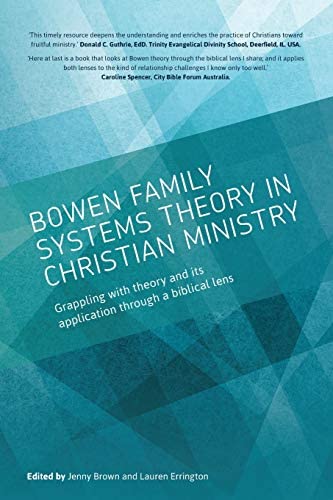
Bowen Family Systems Theory in Christian Ministry by Jenny Brown
Since reading Friedman’s “A Failure of Nerve” and Mark Sayers’ “A Non-Anxious Presence” I’ve been eager to find more Christian application of the secular Bowen framework (which, as a college pastor, I’ve found to be EXTREMELY helpful). This book delivered.
It’s a series of academic papers so it’s a bit clunky. Not difficult to read or too academic, just clunky: “This paper attempts to introduce Bowen family systems theory (here on in referred to as Bowen theory) as a conversation partner in the reading of the text and as a commentator…”
And at the end of every chapter: “This paper has presented a case for the value of generational family research and use of the family diagram as an information generating tool”
Like watching paint dry…
But if you can skim past the dry academic intros and conclusions, there is gold to be found. 5 stars for content. 3 stars for readability.
I’d recommend reading A Failure of Nerve first, then you’ll be ready to jump into this book.
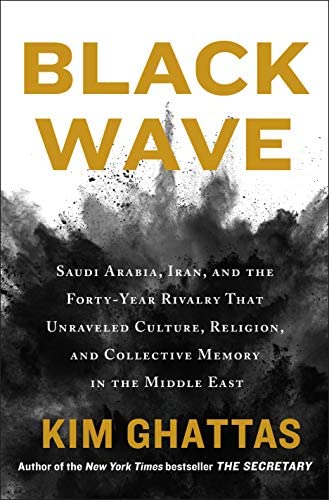
Black Wave: Saudi Arabia, Iran, and the Forty-Year Rivalry That Unraveled the Middle East by Kim Ghattas
Fascinating overview of the last 40 years in the Middle East. Ghattas (who was born in Lebanon) argues that the Iranian Revolution set off a “black wave” of authoritarianism and religious fundamentalism that swept through the Middle East. Essentially: Iran and Saudi Arabia have been locked in a four decade long mimetic rivalry to out-Islam each other.
Very well written- Ghattas makes the incredibly complex and (to western readers) very-foreign world of the Middle East understandable.